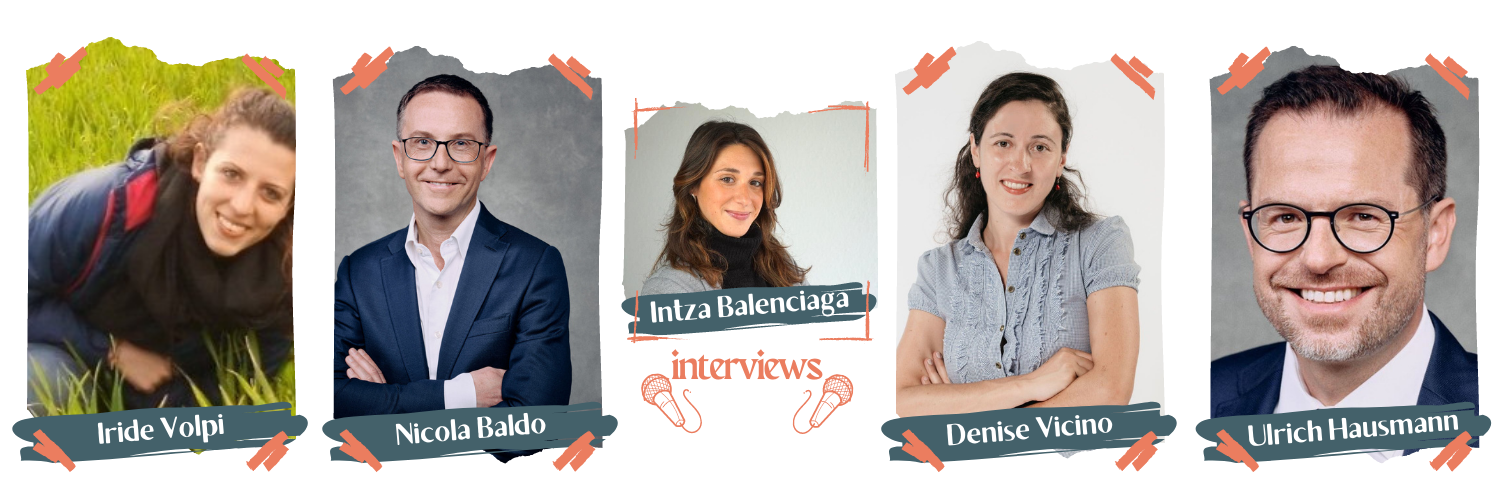ATLAS 2nd open call – Meet our Winners #2
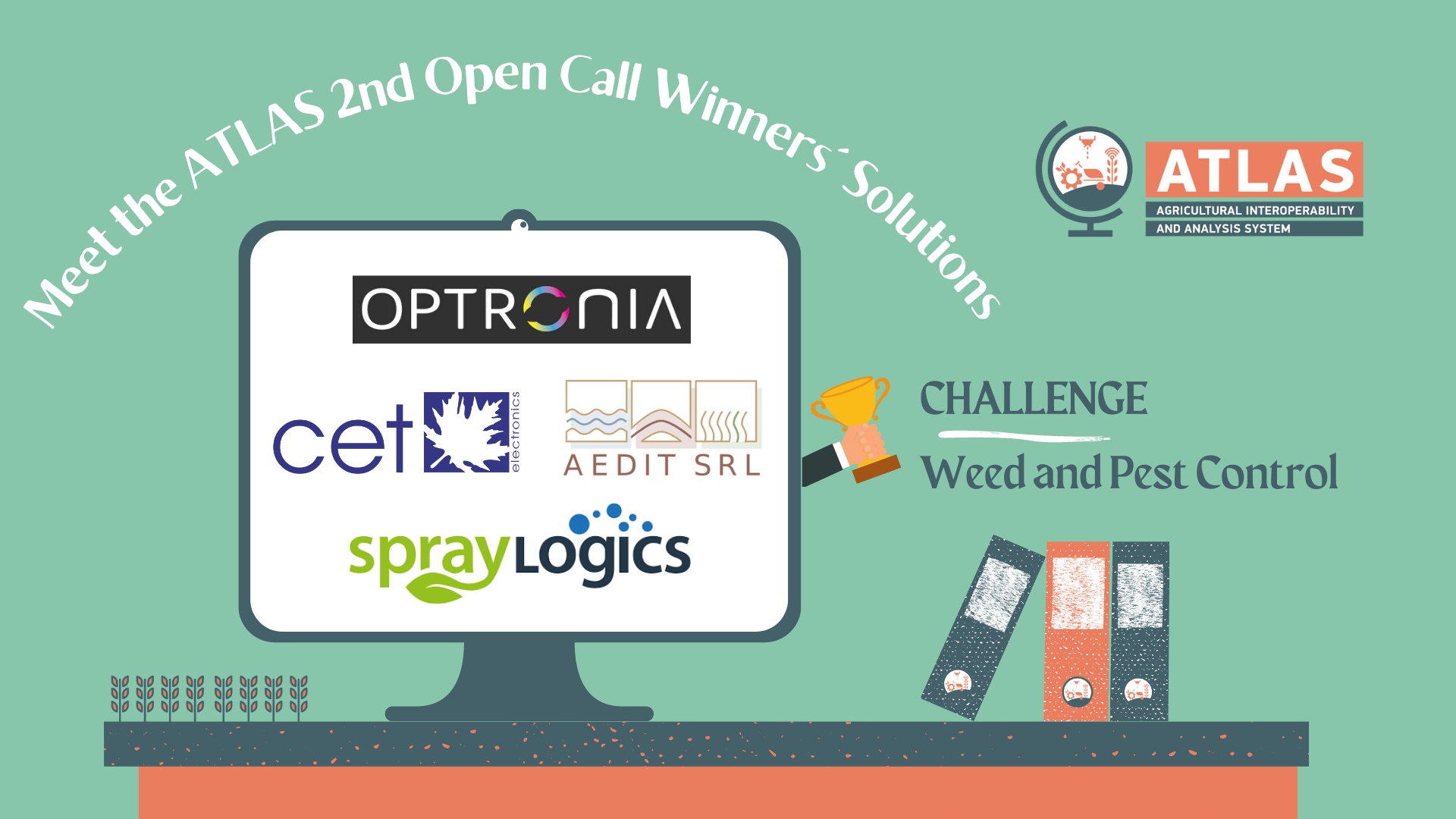
Pesticides are one of the most used instruments in agriculture, and yet it also has the most impact on both the environment and human health. How can we ensure sustainable agriculture and at the same time satisfy the increasing need for food?
Ms Intza Balenciaga, project manager at AZO, recently interviewed Ms Iride Volpi, data analyst at AEDIT srl; Mr Nicola Baldo, CEO of Spray Logics srl; Dr Ulrich Hausmann, CTO and co-founder of Optronia GmbH; and Dr Denise Vicino, CEO of CET Electronics. These ATLAS 2021 Open Call winners had the chance to demonstrate how their innovative solutions – DIGI-PEST, Spray Logics, Optronia and Precision Spraying Kit – will contribute to the ATLAS Interoperability Network by providing first-class data-driven services to tackle agricultural challenges related to weed and pest control.
![]() Please give us a sneak peek of your solutions: why are they relevant in agriculture and how did the ideas behind them emerge?
Please give us a sneak peek of your solutions: why are they relevant in agriculture and how did the ideas behind them emerge?
Ms Iride Volpi: We are a spin-off company of Scuola Superiore Sant’Anna (Pisa, Italy), with 20 years of experience in developing information communication technology (ICT) tools that support smart farming approaches. Our web app, DIGI-PEST, is designed to help address one of the most pressing challenges the agricultural sector is facing today by reducing the negative impacts of pesticides on the environment and providing early warnings and risk assessments for key pests of olive trees, grapevines, and maize crops. DIGI-PEST will be a data-driven decision support system (DSS) that ultimately seeks to support farmers and advisors in optimising the use of pesticides through the application of integrated pest management (IPM). This will bring economic advantages to farmers by reducing both the crop damage caused by pests and the expenses involved in buying pesticides.
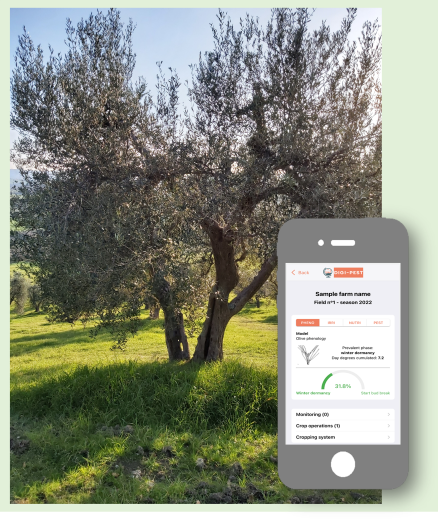 Moreover, the web app will allow farmers and advisors to archive and visualise model results and agricultural operations. The innovative aspects of DIGI-PEST are its “mobile first” approach, the integration of traditional and machine-learning models that can be extended to other crops and pests, and a module for in-field pest monitoring that collects data on pest infestation and retrieves data from in-field sensors (e.g., automated traps). Meanwhile, interoperability is one of the key challenges in digital agriculture, which is why DIGI-PEST adopts standards and protocols that enable it to interface and exchange data with existing farming systems.
Moreover, the web app will allow farmers and advisors to archive and visualise model results and agricultural operations. The innovative aspects of DIGI-PEST are its “mobile first” approach, the integration of traditional and machine-learning models that can be extended to other crops and pests, and a module for in-field pest monitoring that collects data on pest infestation and retrieves data from in-field sensors (e.g., automated traps). Meanwhile, interoperability is one of the key challenges in digital agriculture, which is why DIGI-PEST adopts standards and protocols that enable it to interface and exchange data with existing farming systems.
Mr Nicola Baldo: Spray Logics seeks to develop a prototype sprayer that uses a system controlled by high-precision optical sensors to provide a variable-speed spray output that matches the sectional structures of the canopy in real time. The aim is to improve pesticide spraying efficiency without reducing the expected level of crop protection.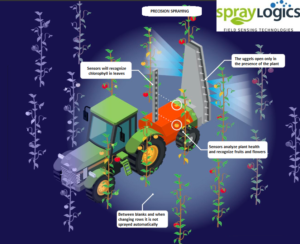 One of the objectives of the European Community’s Green Deal is to reduce the usage of pesticides in agriculture by at least 50% by 2030. Our technology goes beyond this in some cases and will even achieve it in the next two to three years. The benefits for farmers will be manifold. Nowadays, traditional sprayers usually waste 80% of the chemicals that affect the environment. The idea to develop a prototype sprayer that dramatically reduces the quantity of pesticides used on fields was prompted by the environmental crisis.
One of the objectives of the European Community’s Green Deal is to reduce the usage of pesticides in agriculture by at least 50% by 2030. Our technology goes beyond this in some cases and will even achieve it in the next two to three years. The benefits for farmers will be manifold. Nowadays, traditional sprayers usually waste 80% of the chemicals that affect the environment. The idea to develop a prototype sprayer that dramatically reduces the quantity of pesticides used on fields was prompted by the environmental crisis.
Dr. Ulrich Hausmann: Our mission with Optronia is to make optical sensor technology useful in protecting our environment, climate, and biodiversity. We will achieve this goal with our novel optical sensor technology, which will identify and detect weeds and control spraying nozzles with high precision to achieve a huge reduction in herbicide use (up to 90%). Besides the financial advantage for farmers, our technology helps preserve soil that is rich with insects and microorganisms.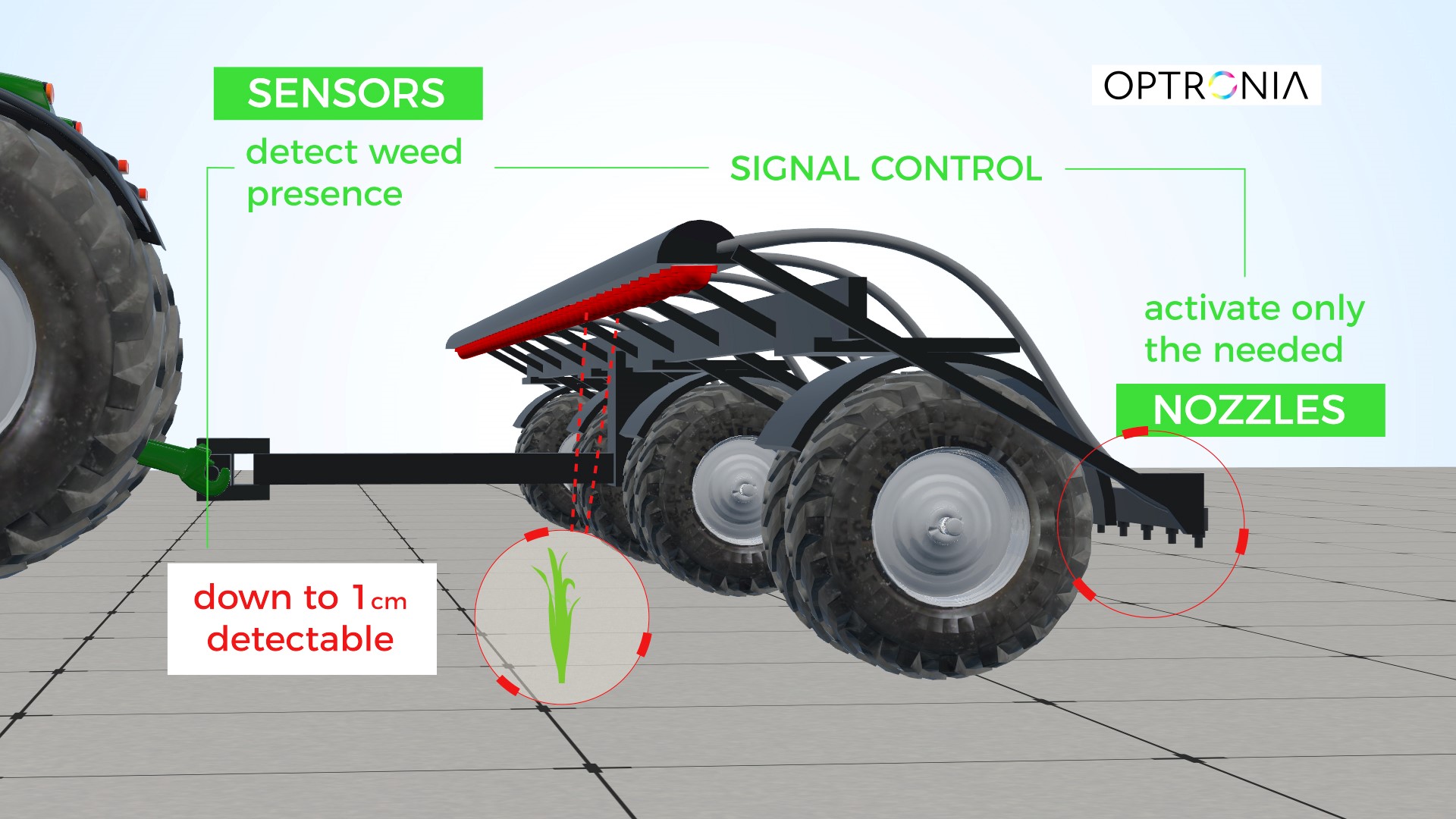 Our team consists of creative, hands-on developers who are passionate about creating new solutions in software, electronics, mechanical engineering, and optics and have the scientific know-how to improve the health and well-being of our environment. We are developing infrastructure and solutions to harness the potential of smart sensor technology in agriculture. Our solutions span three primary areas: smart farming, environmental engineering, and industrial applications.
Our team consists of creative, hands-on developers who are passionate about creating new solutions in software, electronics, mechanical engineering, and optics and have the scientific know-how to improve the health and well-being of our environment. We are developing infrastructure and solutions to harness the potential of smart sensor technology in agriculture. Our solutions span three primary areas: smart farming, environmental engineering, and industrial applications.
Dr. Denise Vicino: We propose a robotic kit for precision spraying in vineyards that is applicable to most of the common trailed or mounted tower sprayers. The system, which is based on using stereo cameras as canopy sensors with on-board image analysis, is paired with independent pulse-width modulation (PWM) nozzles to precisely target vegetation and adapt the spraying rate in real time to the amount of foliage present. An overall 30–50% reduction in the total amount of plant protection products (PPPs) used on a vineyard is expected during a season. The kit also includes a premixing in-line injection apparatus that facilitates automatic dosing and safer preparation of PPP mixtures. A platform including a DSS is used for remote control, the formulation of product doses, and to plan spraying.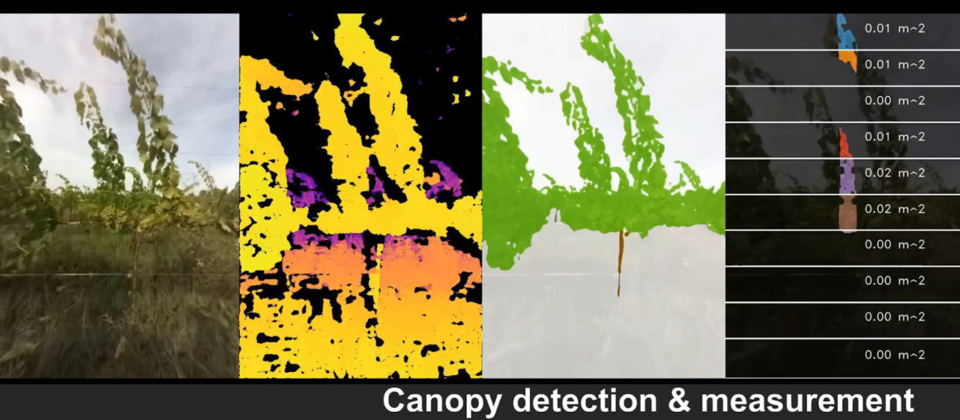 The hardware of our prototype will respect the ATLAS standards through its ability to adapt to other applications, and at the software level, our system will exchange data (on the use of PPPs, visor maps, DSS indications, etc) within the ATLAS framework. Our team consists of engineers, high-level technicians, and PhDs in computer science and physics. Our solution emerged from an application on a small autonomous robot. The application is now being extended to standard sprayers as a follow-up project, which makes it even more challenging due to the higher working speed required.
The hardware of our prototype will respect the ATLAS standards through its ability to adapt to other applications, and at the software level, our system will exchange data (on the use of PPPs, visor maps, DSS indications, etc) within the ATLAS framework. Our team consists of engineers, high-level technicians, and PhDs in computer science and physics. Our solution emerged from an application on a small autonomous robot. The application is now being extended to standard sprayers as a follow-up project, which makes it even more challenging due to the higher working speed required.
![]() What has been your company’s and/or solution’s biggest challenge thus far?
What has been your company’s and/or solution’s biggest challenge thus far?
Ms Iride Volpi: The biggest challenge we face today is to foster the adoption of digital solutions in agriculture by developing custom ICT tools for different agricultural stakeholders using a participatory approach.
Mr Nicola Baldo: Our technology has already completed feasibility studies. Our next challenges will be related to the reliability of the sensor in severe conditions and the industrialisation process that will reduce the cost of our solution.
Dr. Ulrich Hausmann: We are following a novel hybrid approach that combines the strength of multispectral optical sensing, smart data analysis, and selective artificial intelligence. The data (which is mostly from field tests) must be processed and analysed in a very efficient and ultra-fast way to create a smart classification of plant conditions that is sufficient for most control signals. Image processing by artificial intelligence is an expensive technology with high power consumption, which is why we must use it selectively. On-demand image processing is triggered by the multispectral sensor. In this latter case, very cheap and simple embedded vision cameras can be used to complement the multispectral sensor. Instead of searching through hundreds of millions of database entries, the pre-selection reduces the relevant database for the artificial intelligence to a few thousand entries, leading to extremely precise and fast results at a small fraction of the usual power consumption. This was certainly a big challenge.
Dr. Denise Vicino: After working on solutions for the industrial sector since 1976, a few years ago, our company started applying our electronics and software expertise to agriculture with a focus on new technologies for precision farming. The biggest challenge has been dealing with new developments in all their aspects for the different set of sensors and software services for agriculture – from the theoretical point of view to prototyping and field testing – while always driving towards innovation and ensuring we develop robust and effective solutions. Our main achievements relate to the application of innovative computer-vision technologies to monitor and measure plant development, which is an essential component of the Precision Spraying Kit (PSK) solution we are proposing in ATLAS.
![]() What opportunities will ATLAS offer your solution and/or company? How will this interoperability network help you develop and nurture your business case?
What opportunities will ATLAS offer your solution and/or company? How will this interoperability network help you develop and nurture your business case?
Ms Iride Volpi: The lack of interoperability among digital tools and the adoption of them is one of the biggest barriers farmers and advisors face today. ATLAS gives us the chance to offer interoperability while developing DIGI-PEST, which will result in a competitive advantage for AEDIT. The integration of DIGI-PEST into the ATLAS Interoperability Network will help increase our business’s potential for international commercialisation in Europe and beyond.
Mr Nicola Baldo: Collaborating in the ATLAS network will help us set up a standard format for exchanging data collected from our sensor with other stakeholders. It will also enable us to expand our network and share knowledge with the stakeholders involved in this project.
Dr. Ulrich Hausmann: The collaboration with the ATLAS network will help us grow and connect with other stakeholders in similar fields. Hence, it will enable us to enrich our own knowledge and that of others in the network, including the Open Call winners.
Dr. Denise Vicino: We aim to launch our system as a standardised set of tools to be used in the ATLAS network in synergy with other applications. We believe this will give our technology a better chance of spreading among farmers by overcoming the barrier presented by the heterogeneity of the machines, sensors, and platforms currently available in the market. In addition, we expect to create useful synergies and partnerships with other ATLAS participants. Based on others’ experiences and needs, we look forward to getting the opportunity to extend the application of our system – for instance, to another vertical crop!
![]() What was/were the main reason(s) why you decided to participate in the ATLAS Open Call 2021?
What was/were the main reason(s) why you decided to participate in the ATLAS Open Call 2021?
Ms Iride Volpi: When we heard about the second ATLAS Open Call, we decided to participate in order to implement an interoperable digital tool that would increase integration among technologies and data from different ag-tech suppliers. Furthermore, being part of the international ATLAS community gives us the chance to expand our network of contacts for possible future projects and business collaborations.
Mr Nicola Baldo: The ATLAS Open Call, along with the network itself, is a great opportunity to collaborate with other companies working in the field of precision agriculture. Plus, the grant offered by the project will speed up our growing phase.
Dr. Ulrich Hausmann: A solid network like ATLAS can offer us new opportunities, enhance creativity, and offer a new space for innovative ideas. Furthermore, the grant we received from ATLAS will enable us to invest even more resources in R&D and accelerate the development of our current sensor technologies.
Dr. Denise Vicino: We believe the ATLAS Open Call, and the ATLAS network overall, represent a unique opportunity to implement interoperability and to interact and compare ourselves with other technology providers. We’ve already had a collaboration in ATLAS, having won the previous Open Call (2020) with a different project. After that experience, we were encouraged to participate again thanks to the reliable and well organised technical and administrative teams behind the ATLAS network.
![]() Finally, let’s take a quick look into the crystal ball: What’s going to happen with your company and/or solution in the future?
Finally, let’s take a quick look into the crystal ball: What’s going to happen with your company and/or solution in the future?
Ms Iride Volpi: Our goal is to continue the implementation of DIGI-PEST after the end of the project by including models for other pests and targeting more crops. To this end, we are planning to develop new functionalities soon (e.g., to facilitate communication and collaboration between farmers and advisors). With improved interoperability, we will have opportunities to achieve more active interactions and combinations of different modules, and to integrate technologies and data from different suppliers. This will allow us to offer complete and interoperable solutions that meet different stakeholder needs, and it will also open up new business opportunities.
Mr Nicola Baldo: We hope our solution will be adopted by as many farmers as possible in order to leverage the benefits of optical sensor technology in protecting our environment, climate, and biodiversity. Sustainability and savings will be the main selling points for potential customers. We look forward to counting on ATLAS to help us provide these advantages!
Dr. Ulrich Hausmann: We hope to grow and remain an innovative company that continues to make optical sensor technology useful in protecting our environment, climate, and biodiversity.
Dr. Denise Vicino: The current situation in Europe is posing a lot of uncertainties for the future, but no matter what, agriculture will always remain essential for us all. As climate change effects are proving, it’s even more vital than ever to provide solutions for conserving resources and containing production costs. That’s why we are confident that we can grow as a company in this direction. We’ll keep looking for new ideas for improving efficiency and sustainability in agriculture by developing new products or extending the applications of our existing ones to new crops.
Did you enjoy this interview?
Anyone interested in these innovative solutions can obtain key insights at the ATLAS Demo Day 2022
on 23 November (save the date!) or get in touch with these innovators via email at
volpi@aedit.it, info@spraylogics.com, office@optronia.com or cet@cet-electronics.com.
Meanwhile, stay tuned for more upcoming interviews with the ATLAS 2021 Open Call winners
via the ATLAS mailing list or AZO’s blog!

